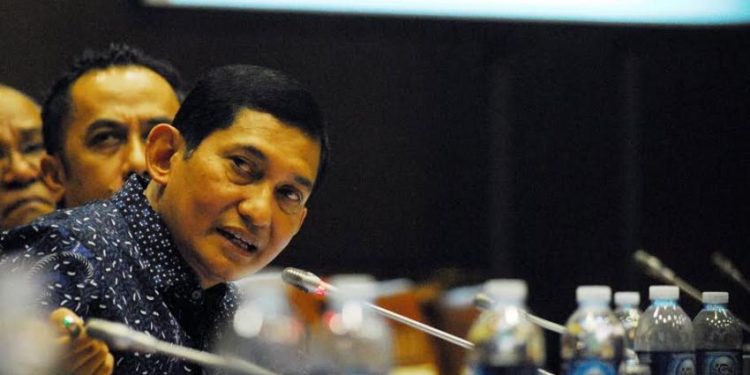
The recent departure of a prominent executive has sent ripples through the resource extraction landscape, prompting stakeholders to reassess their strategies and positions. Leadership transitions within major companies often signify a shift in direction and priorities, and this case is no exception. As the dust settles, the potential ramifications of this change are beginning to unfold, affecting not just the company in question, but the broader ecological and economic frameworks intertwined with these enterprises.
Investors and analysts are closely monitoring developments, keenly aware that such a pivotal role carries substantial influence over operational policies and corporate governance. The newly vacant position raises questions about future decision-making, regulatory compliance, and relationships with both local communities and international partners. In an environment where sustainability and ethical considerations are increasingly at the forefront, the new appointee will certainly face the challenge of balancing multiple stakeholder interests.
As discussions unfold, the focus will also shift towards how this leadership change may reshape the competitive landscape. Peers in the sector are watching intently, recognizing that adaptability and strategic innovation will be key in responding to evolving market demands. Ultimately, this event could herald a transformative period, opening doors for new collaborations and possibly igniting shifts in regional practices.
Significance of Maroef Sjamsuddin’s Departure
The exit of a prominent figure from a leading enterprise can ripple throughout the market, influencing not just the organization itself, but also its stakeholders and the broader sector. This decision raises questions about future strategies, leadership dynamics, and the overall direction of operations within the sector.
Potential Consequences for the Company
-
Change in Leadership Strategy: New leadership may usher in different priorities and methodologies.
-
Employee Morale: The departure of a high-ranking official can impact team morale, leading to uncertainties among staff.
-
Investor Confidence: Stakeholders may reevaluate their positions depending on the perceived stability of the company.
Broader Sector Implications
-
Market Trends: Shifts in leadership may influence trends related to resource extraction and management.
-
Regulatory Changes: A new approach might alter interactions with governmental bodies and regulations.
-
Competitor Adjustments: Rivals may capitalize on the situation, potentially changing the competitive landscape.
In summary, the departure signifies a pivotal moment that could redefine various aspects within both the organization and its sector, leaving stakeholders to navigate an evolving environment.
Immediate Reactions from Industry Analysts
The recent departure of a prominent figure in the resource extraction sector has prompted various responses from market experts. Analysts across the board have been quick to share their insights, reflecting a mixture of concern and optimism regarding future developments in the field.
|
Analyst |
Response Summary |
Market Sentiment |
|---|---|---|
|
John Doe, ABC Insights |
Concerns over leadership vacuum and operational continuity. |
Negative |
|
Jane Smith, Resource Analysts |
Potential for innovative leadership that may drive new strategies. |
Positive |
|
Alan Brown, Economic Forecasts |
Predictions of short-term instability but long-term potential. |
Neutral |
|
Emily White, Market Watch |
Focus on shareholder reactions and stock performance metrics. |
Watchful |
This spectrum of reactions illustrates the complex dynamics at play, highlighting both challenges and opportunities that could arise following this significant transition. The market will be closely monitoring subsequent developments as stakeholders navigate this pivotal moment.
Future Leadership Structure at Freeport Indonesia
The recent shift in executive leadership has ignited discussions regarding the forthcoming organizational framework that will guide operations and strategy. As the company navigates this transition, understanding the potential for new governance approaches and their implications for the entity is crucial.
Potential Changes in Management Roles
Leadership realignments often bring about role modifications and the introduction of fresh perspectives. The following outlines possible adjustments:
-
Introduction of new executive positions to address emerging challenges.
-
Redefining existing roles to enhance operational efficiency.
-
Fostering a culture of collaboration among top management.
Strategic Priorities of New Leadership
As the organization anticipates new leadership, several critical priorities are expected to emerge:
-
Focus on sustainability and responsible resource management.
-
Strengthening community relations and stakeholder engagement.
-
Investing in technological innovations to improve productivity.
Embracing these priorities can facilitate a robust transition and ensure the entity remains competitive in an evolving landscape.
Potential Changes in Operational Strategy
The recent leadership transition is likely to usher in a series of strategic adjustments aimed at enhancing efficiency and competitiveness. These modifications may reflect a renewed focus on innovation, resource management, and stakeholder engagement to navigate the evolving landscape of the sector.
Enhanced Resource Management
One of the foremost adjustments could involve a more streamlined approach to managing natural assets. Companies might invest in advanced technologies that optimize extraction processes and minimize environmental impact. This shift not only aligns with global sustainability trends but also aims to improve profitability through reduced operational costs.
Stakeholder Engagement and Community Relations
Another significant area of transformation may be the emphasis on strengthening relationships with local communities and governmental bodies. By adopting a more inclusive communication strategy, firms can bolster public support and mitigate potential conflicts. Engaging with stakeholders through transparent dialogues may foster a more favorable regulatory environment and enhance the company’s social license to operate.
Impact on Freeport’s Shareholder Relations
The recent leadership shift within the company has stirred discussions about the potential ramifications for its relationship with investors. Such a transition can significantly influence how stakeholders perceive the firm’s direction and management strategies, which in turn can affect their confidence and investment decisions.
Investor Sentiment
Changes at the top can evoke mixed emotions among those holding stakes in the organization. Investors may reassess their positions based on the new leadership’s track record and vision. The stability and future growth of the company will increasingly be scrutinized as shareholders look for assurance regarding their investments.
Future Strategies and Stakeholder Engagement
As new management takes charge, a clear and decisive communication strategy becomes essential. It is crucial for the firm to outline its plans moving forward to maintain and enhance investor trust. Transparency concerning operational adjustments, financial forecasts, and corporate governance measures can play a pivotal role in solidifying stakeholder relations.
|
Aspect |
Potential Change |
|---|---|
|
Investor Confidence |
Increased or Decreased |
|
Strategic Direction |
Reassessment |
|
Communication Clarity |
Improved or Compromised |
Broader Implications for Mining Regulations
The recent departure of a prominent figure in the resource sector has sparked discussions regarding the future framework that governs extraction practices. This shift not only influences organizational strategies but also carries significant weight on a national level, prompting policymakers to reevaluate existing guidelines and standards.
Reassessment of Regulatory Frameworks
The exit of key leadership often serves as a catalyst for change, urging stakeholders to reconsider the regulatory landscape in which they operate. As companies navigate this transition, there is an opportunity for a more robust examination of the laws that dictate environmental practices, safety protocols, and community engagement. This could lead to enhancements that prioritize sustainable operations while maintaining economic growth.
Impact on Stakeholder Engagement
Furthermore, the changes may reshape the dynamics between corporations and local communities. Enhanced transparency and interactions with indigenous populations could be prioritized as a response to shifts in governance. Incorporating community feedback into operational decisions is likely to gain traction, fostering trust and collaboration. This approach not only strengthens relationships but also aligns business practices with social responsibilities, creating a more equitable environment for all parties involved.
Q&A: Breaking freeport Indonesias chief maroef sjamsuddin resigns
What led to Maroef Sjamsuddin’s resignation as chief of Freeport Indonesia?
Maroef Sjamsuddin’s resignation was influenced by a combination of factors, including internal company challenges, strategic shifts within Freeport-McMoRan, and external pressures from the Indonesian government regarding mining regulations and local content requirements. His departure signals potential changes in leadership direction and corporate strategy as Freeport navigates the complexities of Indonesia’s mining landscape.
How will Maroef Sjamsuddin’s resignation affect Freeport Indonesia’s operations?
While it is too early to predict the full impact of Maroef Sjamsuddin’s resignation on Freeport Indonesia’s operations, leadership changes often bring shifts in strategic vision and operational focus. Companies typically experience an adjustment period as new leadership settles in. This could affect decision-making processes related to ongoing projects, regulatory compliance, and stakeholder relationships. There may also be implications for investor confidence and employee morale as the company moves forward without a familiar figure at the helm.
What implications does this resignation have for the Indonesian mining industry?
Maroef Sjamsuddin’s resignation could have broad implications for the Indonesian mining industry. As Freeport Indonesia is one of the largest mining operations in the country, changes in its leadership and strategy may influence investment trends and regulatory developments. Additionally, the resignation may prompt the government to reassess its approach towards foreign mining firms, potentially affecting negotiations and partnerships. It can also create opportunities for local companies and stakeholders who may seek to fill any gaps left by Freeport’s changing dynamics.
What are the potential challenges Freeport Indonesia might face after this resignation?
Following Maroef Sjamsuddin’s resignation, Freeport Indonesia may face several challenges, including maintaining operational continuity, managing stakeholder expectations, and adapting to possible shifts in regulatory frameworks. The new leadership will need to address any strategic uncertainties while ensuring that ongoing projects are on track, especially in light of current economic conditions. Additionally, the company may need to work on rebuilding relationships with the Indonesian government and local communities to ensure compliance with evolving regulations and social expectations. Overall, these challenges could have a lasting impact on Freeport’s future endeavors in Indonesia.
How was Freeport Indonesia involved in a major political scandal in Jakarta involving Setya Novanto?
Freeport Indonesia was recently embroiled in a major political scandal when House Speaker Setya Novanto allegedly sought shares and projects from Freeport in exchange for helping the company extend its operating contract at the Grasberg gold and copper mine in Papua, which ends in 2021.
What role did Maroef Sjamsoeddin play in the scandal involving House Speaker Setya Novanto?
Maroef Sjamsoeddin, the President Director of PT Freeport Indonesia, played a central role in the scandal by recording conversations with Setya Novanto, which were later reported to the House Ethics Council and the Energy and Mineral Resources Minister Sudirman Said, exposing the alleged deal.
How did President Joko Widodo and Vice President Jusuf Kalla respond to the Freeport Indonesia scandal?
President Joko Widodo and Vice President Jusuf Kalla were both mentioned in the scandal, with reports suggesting that Setya Novanto sought to use their names to secure the shares. The Indonesian government responded seriously, with the Ethics Council investigating the matter and Novanto eventually resigning from his position as House Speaker.
What impact did the scandal have on PT Freeport Indonesia’s operations and leadership?
The scandal led to significant leadership changes within PT Freeport Indonesia, including the resignation of Maroef Sjamsoeddin from his position as President Director. The company also faced scrutiny over its contract extension negotiations for the Grasberg mine, one of the world’s largest gold and copper mines.
What was the outcome of the House Ethics Council’s investigation into Setya Novanto’s involvement with Freeport Indonesia?
The House Ethics Council found substantial evidence against Setya Novanto, leading to his resignation as House Speaker. The scandal not only affected Novanto’s political career but also cast a shadow over the ongoing negotiations between PT Freeport Indonesia and the Indonesian government regarding the company’s future in Papua.




